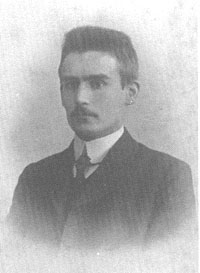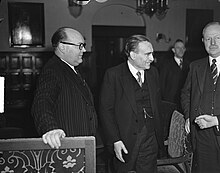Willem Drees
[6] During his premiership, his cabinets were responsible for several major social reforms to social security, welfare, child benefits and education, overseeing the decolonization of the Dutch East Indies following the Indonesian National Revolution, the fallout of the annexation of former German territory and dealing with several major crises such as the North Sea flood of 1953 and Hofmans scandal.
Drees was granted the honorary title of Minister of State on 22 December 1958 and continued to comment on political affairs as a statesman until his death in May 1988 at the age of 101.
He holds the record as the fourth longest-serving and longest-lived Prime Minister at 101 years, 314 days and his premiership is consistently regarded both by scholars and the public to have been one of the best in Dutch history.
He attended the three-year hogereburgerschool (HBS), supplemented by the two final grades of the Amsterdam Public Trade School.
Drees grew up attending Sunday school and catechism, but rejected the Christian creed at the age of eighteen.
At the age of sixteen, Drees became a member of the Dutch Association for the Abolition of Alcoholic Beverages, and would remain a teetoler for the rest of his life.
After attending a speech of Pieter Jelles Troelstra following his election victory in Amsterdam in December 1902, Drees became a democratic socialist.
In July 1906, Drees quit his job at the Twentsche Bank and pursued his passion, becoming a stenographer at the municipal council of Amsterdam, and then at the States General of the Netherlands in The Hague from January 1907 until August 1919.
Drees was asked to succeed Willem Vliegen as the SDAP's national chairman in 1926 and he reluctantly accepted, but after the party's secretary and several local branches protested his nomination at the party congress of that year due to Drees' limited national fame, he withdrew his nomination.
In the context of the Great Depression, he was a proponent of an active crisis policy of industrial planning and the execution of large-scale public works; he saw industrialisation as the structural solution to mass unemployment.
Shortly after the German invasion of the Netherlands, Albarda announced he was stepping down as party leader, and Drees was unanimously selected as his successor on 14 May 1940.
[14] His period in office saw at least four major political developments: the traumas of decolonisation, economic reconstruction, the establishment of the Dutch welfare state,[15][16] and international integration and co-operation, including the formation of Benelux, the OEEC, NATO, the European Coal and Steel Community, and the European Economic Community.
"[20] A Law of 22 June 1950 established the Praeventiefonds with the task of making funds available "to take measures aimed at preventing disease or promoting health.
"[21] From 1950 to 1957, the Praeventiefonds received a separate budget "from the Equalization Fund for supplementary nutrition for TB patients curing at home.
[30] The General Widows and Pensions Act was also drafted, which was passed under the second Beel cabinet[31] In terms of working conditions, safety Regulations for Electric Passenger and Goods Lifts with a Cage that can be entered were introduced on 15 June 1949.
The new sections deal with construction, repair or demolition of buildings, foundations, water works, underground conduits and roads.
[35] In the legislative amendment of 19 January 1955, after a number of failed attempts, the regulation of working and rest times in agriculture was realized in the Labor Act 1919.
According to one study, "by making participation in the associations mandatory, Drees was able to vastly expand the scope of the workforce covered by social security programs, guaranteeing a greater degree of uniformity in the benefits workers received.
[47] In education, measures were carried out such as increased expenditure on the system, a reduction in registration fees at state universities and at the institute of technology,[44] and the granting (in January 1956) of a special benefit to primary school teachers and to certain categories of vocational teachers, "particularly those who risk being unemployed and who cannot lay claim to a retaining fee.
"[48] From 1951 onwards government grants were provided to 'impoverished young people from very good study aptitude that met reasonable requirements of general development and civilization' (De Looper, 1997).
[49] A doubling of the deduction of costs for learning and studying children aged 16 to 27 from income and wealth tax was achieved, followed by a triple deduction for income, wage and wealth taxes for parents with studying children aged 16 to 27 who lived away from home and who were largely supported by their parents.
[53] A department of social welfare was also established (1952),[45] employment facilities for the disabled were expanded and care for the blind received money.
[55] That same year, the Ministry of Social Affairs began granting subsidies "to promote the employment of the blind, on the one hand through contributions for individual cases (purchase or conversion of equipment, transport, etc.
[56] From 1953, subsidies to voluntary agencies serving the physically and the mentally handicapped were included in the budget of the Ministry of Culture, Recreation, and Social Welfare, when they were introduced as an experiment that year.
[57] In addition, "Government care for passengers on inland vessels started with the establishment of the Social Commission for Boatmen in 1956.
[59] In 1957, "the task of the Central Commission for Cultural Work in Labor Camps (CCCA) was modified and expanded and at the same time the Provincial and Local Committees were abolished.
He was granted the honorary title of Minister of State on 22 December 1958 and continued to comment on political affairs as a statesman until his death in May 1988 at the age of 101.
He continued to be active as a valued historian and prolific author and served on several state commissions and councils on behalf of the government.
[67] From 22 August 1986, when former Turkish President Celâl Bayar died, until his own death Drees was the world's oldest living former head of government.




